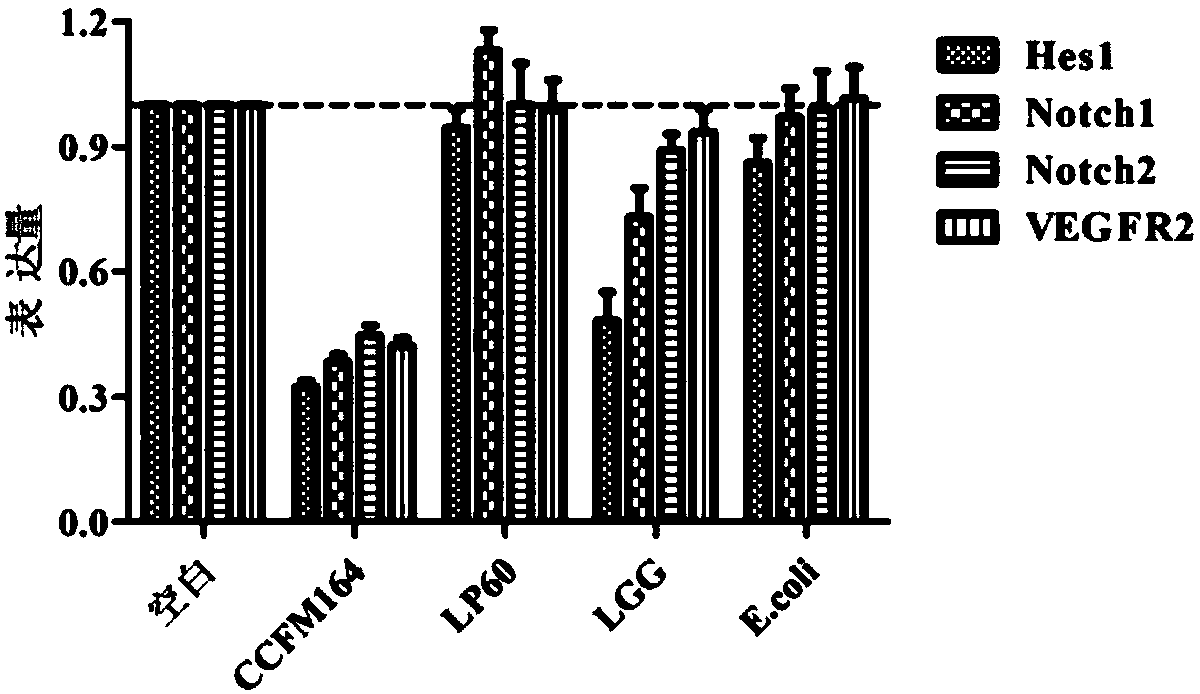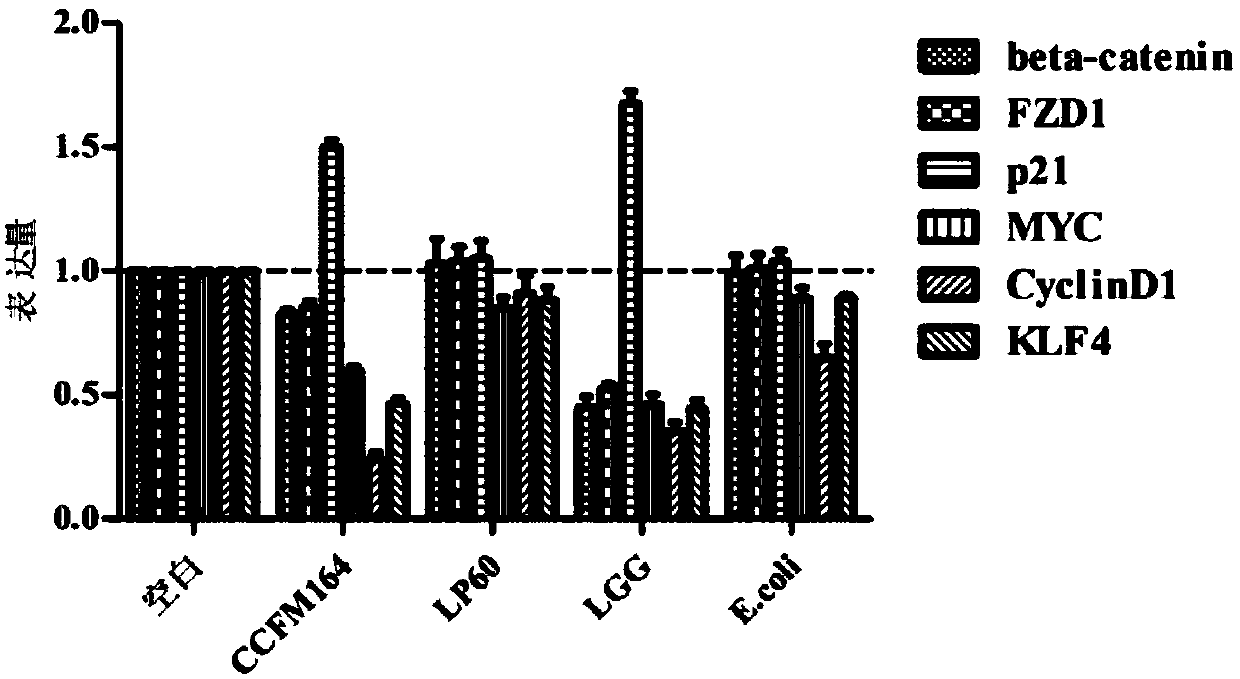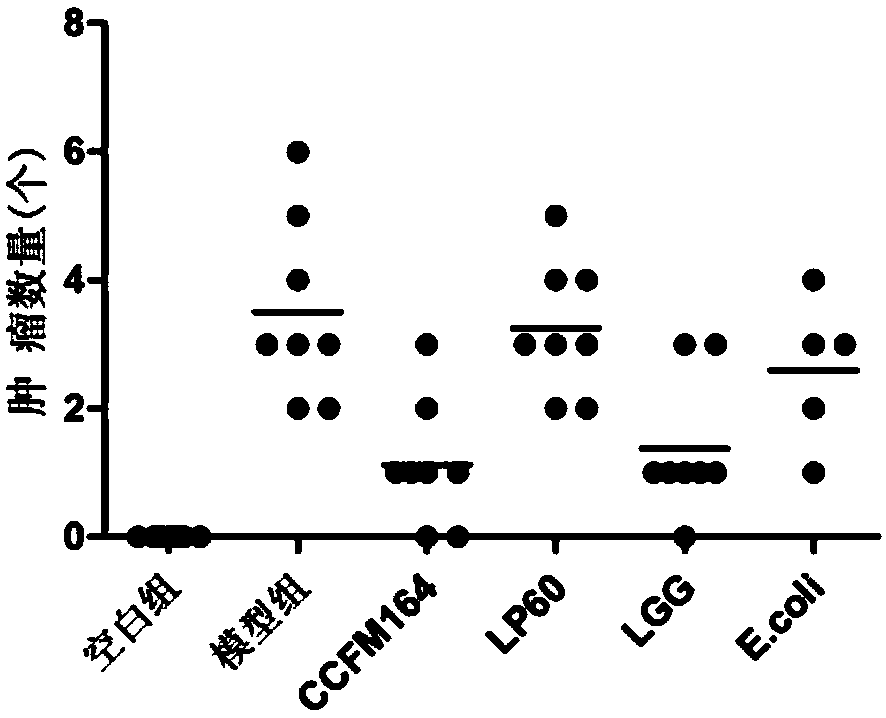Lactobacillus plantarum with colorectal cancer inhibition function and application of Lactobacillus plantarum
A technology of Lactobacillus plantarum and microorganisms, applied in the field of microorganisms, can solve the problems of not being used for food, unclear regulation of tumor-related signaling pathways, etc., and achieve the level of relieving inflammation, good resistance to gastric acid and bile salts, and good tolerance. Effect
- Summary
- Abstract
- Description
- Claims
- Application Information
AI Technical Summary
Problems solved by technology
Method used
Image
Examples
Embodiment 1
[0065] Example 1: Lactobacillus plantarum CCFM164 has good tolerance to simulated gastrointestinal fluid
[0066] Streak inoculation of cryopreserved Lactobacillus plantarum CCFM164 in MRS solid medium, aerobic static culture at 37°C for 24 hours, and subculture by MRS medium for 2 to 3 times, then take Lactobacillus plantarum CCFM164 culture medium, The bacteria were collected by centrifugation at 8000×g for 5 min, resuspended in (1:1) artificial simulated gastric juice of pH 2.5 (MRS medium containing 1% pepsin, pH=2.5), and then cultured aerobically at 37°C. Samples were taken at the beginning (0h), 1h, 2h and 3h, and MRS agar medium was used to pour culture for plate colony counting, and the number of viable bacteria was determined and the survival rate was calculated. The survival rate is the ratio of the number of viable bacteria in the culture medium to the number of viable bacteria at 0h, expressed in %.
[0067] Take the culture solution of Lactobacillus plantarum CC...
Embodiment 2
[0072] Example 2: Regulation of Lactobacillus plantarum CCFM164 on Notch1, Notch2, VEGFR2 and colon cancer-related signaling pathways in HT-29 cells
[0073] Use antibiotic-free RPMI1640 cell culture medium to resuspend Lactobacillus plantarum CCFM164 (or control Lactobacillus plantarum LP60, LGG, Escherichia coli E.coli) sludge washed twice with PBS, and adjust the cell density to about 2× 10 8 CFU / mL; CCFM164 (or LP60, LGG, E.coli) suspension was added to the 6-well plate cultured with HT-29 according to the amount of 2 mL of bacterial suspension per well (the degree of cell fusion reached 95%), and the blank group Add 2 mL of antibiotic-free cell culture medium and place at 37 °C with 5% CO 2 Incubate in a cell culture incubator for 2 hours; wash the cells 3 times with PBS, add 1 mL TRIzol to each well (6-well plate), let stand at room temperature for 5 minutes, repeatedly pipette with an enzyme-free pipette tip, and then transfer to 1.5 mL enzyme-free According to the in...
Embodiment 3
[0078] Example 3: Lactobacillus plantarum CCFM164 has no acute toxic side effects on mice
[0079] Lactobacillus plantarum CCFM164 was resuspended in 2% (w / v) sucrose solution, and the cell density was 4.0×10 9 CFU / mL. Take 10 healthy male BALB / c mice with a body weight of about 25 g, give the suspension of this concentration orally once a day, observe for a week, and record the death and body weight.
[0080] The results of these tests are listed in Table 4. These results indicated that feeding concentrations of 4.0×10 9 CFU / mL of Lactobacillus plantarum CCFM164 had no significant effect on mice, no significant change in body weight, and no death. The appearance of the mice had no obvious pathological symptoms.
[0081] Table 4 Changes in body weight and death conditions of mice
[0082] time (days)
[0083] Note: -: no death of mice
PUM
 Login to View More
Login to View More Abstract
Description
Claims
Application Information
 Login to View More
Login to View More - R&D
- Intellectual Property
- Life Sciences
- Materials
- Tech Scout
- Unparalleled Data Quality
- Higher Quality Content
- 60% Fewer Hallucinations
Browse by: Latest US Patents, China's latest patents, Technical Efficacy Thesaurus, Application Domain, Technology Topic, Popular Technical Reports.
© 2025 PatSnap. All rights reserved.Legal|Privacy policy|Modern Slavery Act Transparency Statement|Sitemap|About US| Contact US: help@patsnap.com



